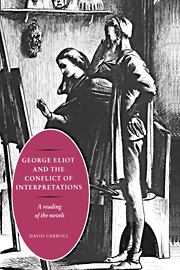Book contents
- Frontmatter
- Contents
- Preface
- Introduction: a working hypothesis
- 1 Scenes of Clerical Life: familiar types and symbols
- 2 Adam Bede: pastoral theodicies
- 3 The Mill on the Floss: growing up in St Ogg's
- 4 Silas Marner: rustic hermeneutics
- 5 Romola: duplicity, doubleness, and sacred rebellion
- 6 Felix Holt: commentaries on the apocalypse
- 7 Middlemarch: empiricist fables
- 8 Daniel Deronda: coercive types
- Conclusion
- Notes
- Index
Introduction: a working hypothesis
Published online by Cambridge University Press: 17 August 2009
- Frontmatter
- Contents
- Preface
- Introduction: a working hypothesis
- 1 Scenes of Clerical Life: familiar types and symbols
- 2 Adam Bede: pastoral theodicies
- 3 The Mill on the Floss: growing up in St Ogg's
- 4 Silas Marner: rustic hermeneutics
- 5 Romola: duplicity, doubleness, and sacred rebellion
- 6 Felix Holt: commentaries on the apocalypse
- 7 Middlemarch: empiricist fables
- 8 Daniel Deronda: coercive types
- Conclusion
- Notes
- Index
Summary
At the climax of The Mill on the Floss, Maggie Tulliver sits alone in an agony of complete uncertainty. Her life has reached an impasse in which the opposing claims on her are so finely balanced that decision is impossible. In the silence she listens to two voices, two texts which she knows by heart and which speak through her, offering conflicting interpretations of her dilemma. Stephen Guest's letter calls her out of her penance ‘back to life and goodness’, to which in counterpoint she murmurs the words of the Imitation of Christ like a prayer: ‘I have received the Cross’. There is no possible resolution of the conflict between passion and duty, for the terms themselves have by now become interchangeable. ‘Am I to struggle and fall and repent again?’ asks Maggie, as she listens to each voice in turn through the rising storm. Oscillation has taken the place of narrative progression and any kind of closure seems impossible. At this moment the flood-waters rise around her and the novel proper ends as the heroine breaks through into a different fictional reality: ‘She was not bewildered for an instant – she knew it was the flood’.
This is the kind of culminating episode we are familiar with in novels by George Eliot. The central character, usually the heroine, experiences a moment of extreme oscillation, contradiction, or vertigo. It is a privileged moment towards which the whole narrative has been moving and it announces that the search for a coherent view of the world has finally broken down. Every possible scheme of meaning within the novel has been found partial and inadequate. Such episodes indicate the limits of intelligibility.
- Type
- Chapter
- Information
- George Eliot and the Conflict of InterpretationsA Reading of the Novels, pp. 1 - 37Publisher: Cambridge University PressPrint publication year: 1992



